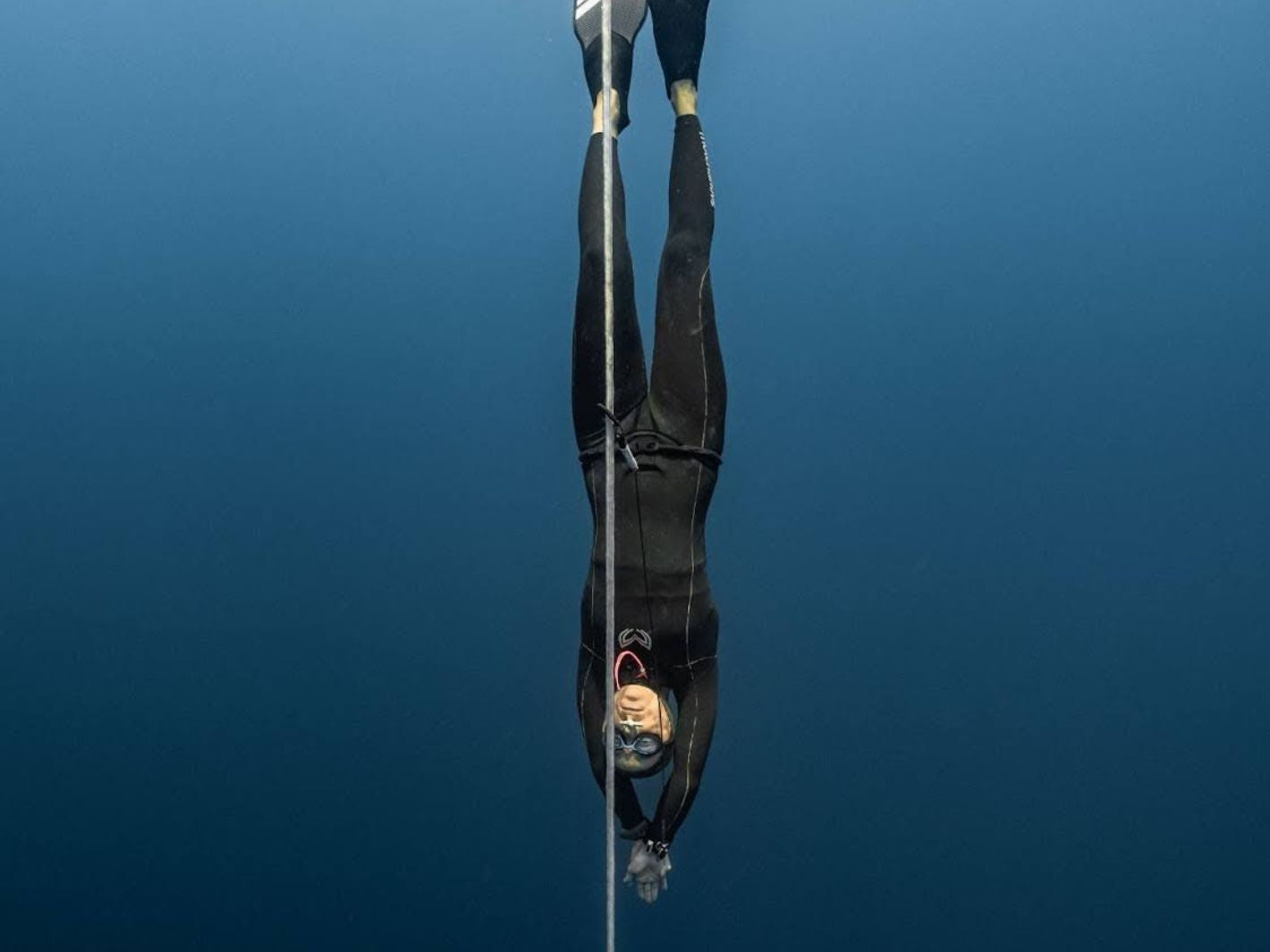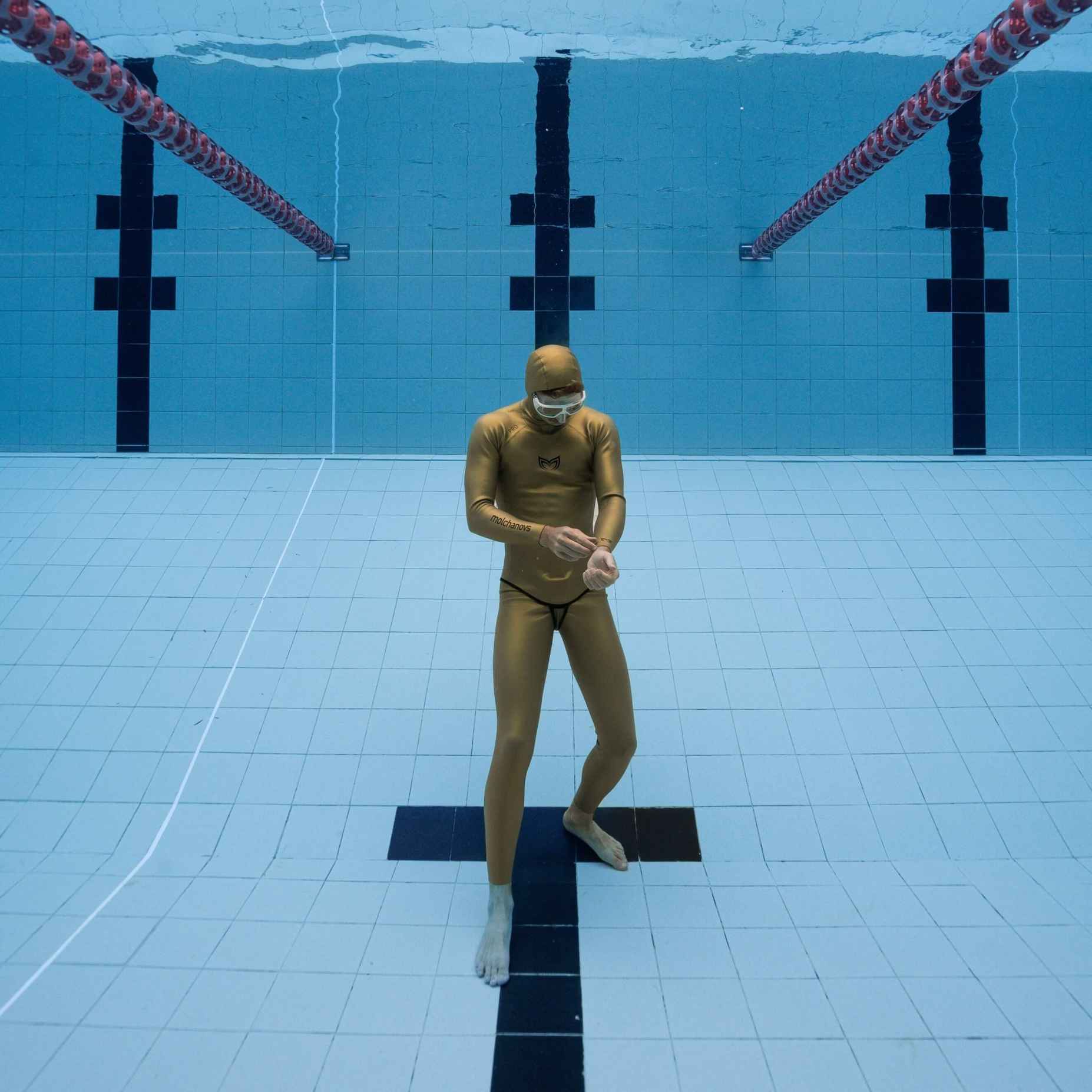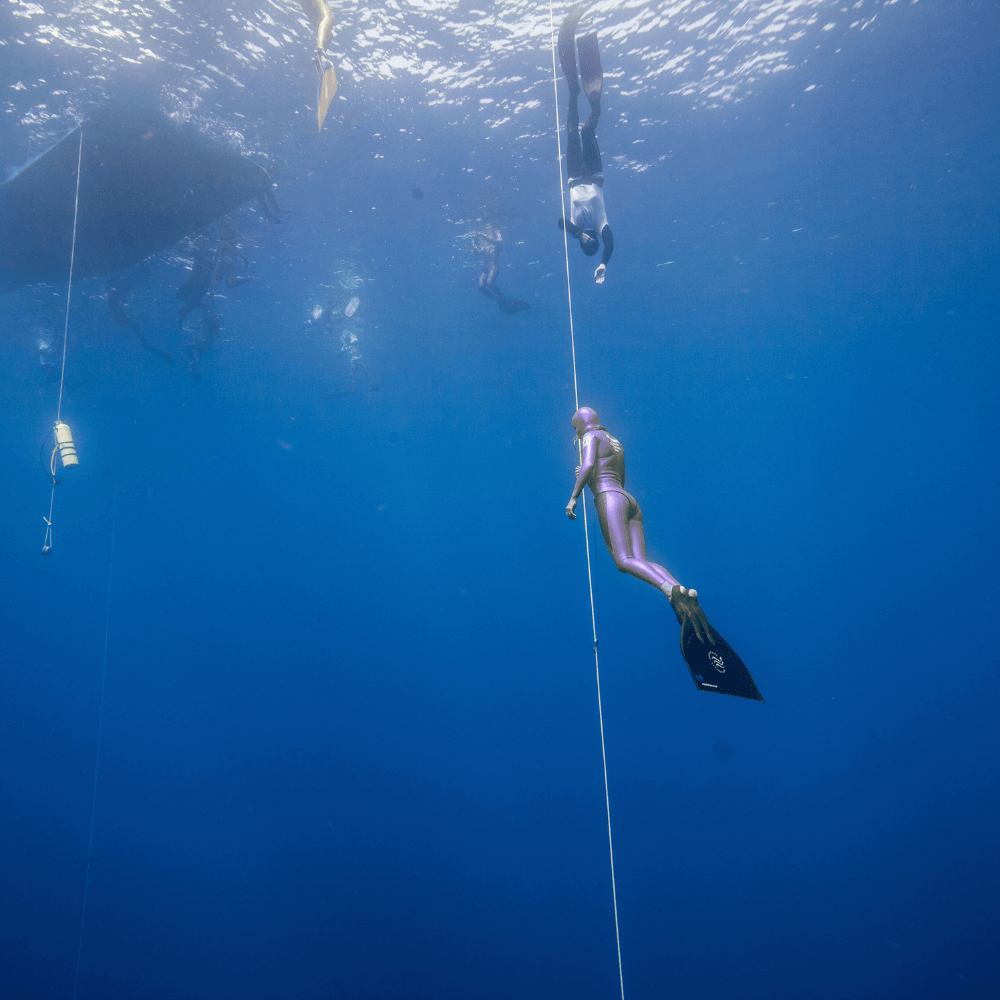How Nutrition Supports Freediving & Relaxation

How to fuel your passion: Get nutrition tips from Australia's deepest female freediver.
By Tara Kate Rawson – Sports Dietitian & Freediving Athlete
Photos: © Andac Kazar at the Asian Freedive Cup
As both a sports dietitian and freediving athlete, I’m often asked how nutrition can support freediving, breath-holding, and diving deeper. While physical and mental training are essential, what we eat and when can make a surprising difference to how we feel, perform, and recover.
In this article, I’ll share how smart nutrition strategies can support your breath-hold, aid relaxation, and help freedivers dive deeper, safer, and with more ease.
Why Nutrition Matters in Freediving
Freediving places the body under unique physiological stress: high carbon dioxide, low oxygen, pressure changes, and mental demands. We ask our bodies to use oxygen efficiently, convert energy and stay calm in a somewhat stressful state. Nutrition, when done well, doesn’t just fuel us, it regulates our nervous system, preserves oxygen, and sharpens focus.
Smart food and hydration choices can help:
- Stabilise blood glucose
- Enhance oxygen availability and circulation
- Boost nitric oxide (NO) for vasodilation
- Prevent cramping and dehydration
- Regulate nervous system tone
- Aid recovery and immune resilience
- Support mental clarity under stress
Fuel for Calm, Not Just Energy
Fasting before a dive might suit static apnea, but for dynamic and depth sessions, fuelling properly improves:
- Muscle performance
- Focus under hypoxia
- Calmness through stable blood glucose
- Recovery between dives
A pre-dive snack 1.5-2 hours before training should focus on easily digestible carbs, low-fat, and moderately low protein. This provides fuel for the working muscle and increases focus while minimising digestive stress.
Smart pre-dive options:
- Oats with banana
- Toast with nut butter and honey
- Smoothie with oats, banana, milk of choice, cinnamon and protein powder
Carbohydrates are the most efficient fuel for freediving. They provide rapid energy for the working muscles while supporting the brain’s glucose needs under pressure. Adequate carb intake preserves muscle glycogen, reduces reliance on stress hormones, and helps maintain parasympathetic tone, which is key for slowing the heart rate and conserving oxygen. Low-carb states increase sympathetic activation, compromising relaxation, breath-hold duration, and depth potential.
Protein is less about immediate energy and more about muscle repair, enzyme support, and immune defence. Small amounts pre-dive (e.g. nut butter, protein powder) are fine, but the main protein intake is best post-dive for recovery i.e. meat, eggs, tofu, fish or dairy.
Avoid bulky, high-fat meals close to training—they can slow digestion, increase diaphragm tension, and compromise relaxation.
Hydration & Circulation Hydration is critical not only for preventing cramps but also for supporting circulation and oxygen delivery. Even mild dehydration increases blood viscosity, elevates heart rate, and can impair the body's ability to activate the dive reflex. Just 2% fluid loss impairs performance and clarity.
Hydration targets:
- 35–45 ml/kg/day baseline
- Plus about 500 ml/hr during water sessions
- Include electrolytes during long/hot sessions
- Aim for pale yellow urine
 Photo: © Andac Kazar at the Asian Freedive Cup
Photo: © Andac Kazar at the Asian Freedive Cup
Oxygen conservation
Iron is non-negotiable. It’s essential for making haemoglobin (blood) for oxygen transport. Even marginal iron deficiency reduces oxygen-carrying capacity and cuts your dive short. Red meat, lentils, and dark leafy greens (with vitamin C for absorption) should be regular features in your diet.
Nitrate-rich vegetables like beetroot, spinach, and rocket stimulate nitric oxide (NO) production, which dilates blood vessels and improves oxygen delivery. Research shows beetroot juice can increase breath-hold time and reduce perceived effort. Aim for ~300–500 mg nitrates pre-dive (equivalent to ~250 ml beetroot juice or a tbsp of beetroot powder).
Antioxidants counteract oxidative damage from repeated hypoxia-reoxygenation cycles. Think berries, citrus, capsicum, cacao, and extra virgin olive oil to optimise your recovery.
Micronutrients for freediving
Micronutrients are critical in freediving, supporting neuromuscular control, oxygen utilisation, energy metabolism, and psychological resilience. Here are the top ones for freedivers:
 Tara in the kitchen. Photo © Peter George
Tara in the kitchen. Photo © Peter George
- Magnesium: 300–400 mg/day supports muscle relaxation and GABA-mediated calm.
- Sources: pumpkin seeds, spinach, almonds, dark chocolate, black beans, avocado.
- B12 & Iron: Essential for oxygen delivery and mitochondrial energy.
- Sources B12: eggs, dairy, salmon, beef, nutritional yeast (fortified).
- Sources Iron: red meat, liver, lentils, spinach, tofu, sardines.
- Omega-3s: Improve brain function, reduce inflammation.
- Sources: salmon, mackerel, sardines, chia seeds, flaxseeds, walnuts.
- B Vitamins: Regulate stress response and energy metabolism.
- Sources: whole grains, eggs, legumes, leafy greens, seeds, animal proteins.
- Vitamin C & Zinc: Critical for tissue repair, immunity, and antioxidant recycling.
- Sources Vitamin C: kiwi, citrus, berries, capsicum, broccoli.
- Sources Zinc: oysters, pumpkin seeds, cashews, beef, chickpeas.
Nutrition matters: Fuel body and mind
Freediving is not just about lung capacity, it’s the interplay of physiology and psychology. Nutrition directly influences the calm, oxygen-efficient, resilient state needed for depth, performance, and safety. As freedivers, we must fuel both the body and nervous system.
As a sports dietitian and freediver, I’ve learned that there’s no one-size-fits-all plan. Begin with simple changes: observe how meals and hydration affect your energy, focus, and calm. Over time, you’ll identify what truly sustains you both physically and mentally.
Disclaimer: This article discusses general nutrition tips for freediving and is not a replacement for personalised medical or dietary advice. Every individual’s health and physical condition is unique—please consult a medical professional before implementing any nutritional changes related to freediving performance or safety.
Want to dive deeper? Learn more about freediving and inspiring athletes. Subscribe to our newsletter for the latest news.




sorry I was meant to sign off as Drawn2Water
Great read, so awesome to see your progression and passion for freediving Tara! Will never forget our dreamy course in Broome on the Whitsundays ! Mick and Justine Drawn@Water
Much appreciated. Very useful information. Thank you very much.
Great read! Thanks for the tips, Tara.
Thank you, this is super helpful, I’ve recently gone WFPB and no oil for my heart health (and it’s working) . This has given me some good tips for my nutrition and fuelling for my freedive training, thank you
Leave a comment